
FACULTY OF ARTS AND SCIENCES
Department of Sociology
SOC 350 | Course Introduction and Application Information
| Course Name |
Technology and Changing Society
|
|
Code
|
Semester
|
Theory
(hour/week) |
Application/Lab
(hour/week) |
Local Credits
|
ECTS
|
|
SOC 350
|
Fall/Spring
|
3
|
0
|
3
|
6
|
| Prerequisites |
None
|
|||||
| Course Language |
English
|
|||||
| Course Type |
Elective
|
|||||
| Course Level |
First Cycle
|
|||||
| Mode of Delivery | - | |||||
| Teaching Methods and Techniques of the Course | - | |||||
| Course Coordinator | - | |||||
| Course Lecturer(s) | - | |||||
| Assistant(s) | - | |||||
| Course Objectives | The goal of this course is to develop sociological perspective about the relationship between technology and society.\n\n |
| Learning Outcomes |
The students who succeeded in this course;
|
| Course Description | This course covers major sociological tools to understand technology, technology-society relationship and the changing role of technological systems in society. |
|
|
Core Courses | |
| Major Area Courses |
X
|
|
| Supportive Courses | ||
| Media and Management Skills Courses | ||
| Transferable Skill Courses |
WEEKLY SUBJECTS AND RELATED PREPARATION STUDIES
| Week | Subjects | Related Preparation |
| 1 | Introduction | |
| 2 | Sources of Technological Change | Volti, R. (2005). Society and technological change. Macmillan. CH.3. pp.41-59. |
| 3 | The Social Construction of Technology | Nightingale, P. (2014). What is technology? Six definitions and two pathologies. Six Definitions and Two Pathologies (October 10, 2014). SWPS, 19. Langdon Winner, “Do Artifacts have Politics?,” Ch.2 in The Whale and the Reactor: A Search for Limits in an Age of High Technology (University of Chicago Press, 1986), p. 19-39. Trevor Pinch and Wiebe Bijker, “The Social Construction of Facts and Artifacts: Or, How the Sociology of Science and the Sociology of Technology Might Benefit Each Other,” in Bijker, Hughes & Pinch (eds.), The Social Construction of Technological Systems, (MIT Press, 1987), p. 17-50. |
| 4 | Technology as Social Force | Nightingale, P. (2014). What is technology? Six definitions and two pathologies. Six Definitions and Two Pathologies (October 10, 2014). SWPS, 19. Langdon Winner, “Do Artifacts have Politics?,” Ch.2 in The Whale and the Reactor: A Search for Limits in an Age of High Technology (University of Chicago Press, 1986), p. 19-39. Trevor Pinch and Wiebe Bijker, “The Social Construction of Facts and Artifacts: Or, How the Sociology of Science and the Sociology of Technology Might Benefit Each Other,” in Bijker, Hughes & Pinch (eds.), The Social Construction of Technological Systems, (MIT Press, 1987), p. 17-50. |
| 5 | Technologies of Control | Sally Wyatt, “Non-Users Also Matter: The Construction of Users and Non-Users of the Internet,” in: Pinch and Oudshoorn, Eds., How Users Matter (MIT Press, 2003): 67-80. |
| 6 | Critical Theories on Technology | Wendling, A. (2009). Karl Marx on technology and alienation. Springer. Feenberg, A. (2012). Questioning technology. Routledge. |
| 7 | Work in Nonindustrial Societies | Volti, R. (2005). Society and technological change. Macmillan. CH.9-10 |
| 8 | Review /Midterm | |
| 9 | Technology and Communication | Volti, R. (2005). Society and technological change. Macmillan. CH.12 |
| 10 | Technology and Communication | Volti, R. (2005). Society and technological change. Macmillan. CH.13-14 |
| 11 | Organizations and Technological Change | Volti, R. (2005). Society and technological change. Macmillan. CH.19 |
| 12 | Gender and Technology | Lee Kleinman, D. (2005) Science and Technology in Society. Blackwell. CH.6 |
| 13 | Democracy and Citizenship in High Tech Age | Lee Kleinman, D. (2005) Science and Technology in Society. Blackwell. CH.7 |
| 14 | Algorithms in Society | Gillespie, Tarleton. 2013. “The Relevance of Algorithms.” Pp. 167-194 in Gillespie, T., Boczkowski, P. J., & Foot, K. A. (Eds.). (2014). Media technologies: Essays on communication, materiality, and society. MIT Press. |
| 15 | Algorithms and the self | Cheney-Lippold, John. 2011. ”A New Algorithmic Identity: Soft Biopolitics and the Modulation of Control.” Theory, Culture & Society 28 (6): 164-181. |
| 16 | Discussion of Group Projects |
| Course Notes/Textbooks |
|
|
| Suggested Readings/Materials | Volti, R. (2005). Society and technological change. NY: Macmillan. |
EVALUATION SYSTEM
| Semester Activities | Number | Weigthing |
| Participation |
1
|
10
|
| Laboratory / Application | ||
| Field Work | ||
| Quizzes / Studio Critiques | ||
| Portfolio | ||
| Homework / Assignments | ||
| Presentation / Jury |
1
|
20
|
| Project |
1
|
30
|
| Seminar / Workshop | ||
| Oral Exams | ||
| Midterm | ||
| Final Exam |
1
|
40
|
| Total |
| Weighting of Semester Activities on the Final Grade |
3
|
60
|
| Weighting of End-of-Semester Activities on the Final Grade |
1
|
40
|
| Total |
ECTS / WORKLOAD TABLE
| Semester Activities | Number | Duration (Hours) | Workload |
|---|---|---|---|
| Theoretical Course Hours (Including exam week: 16 x total hours) |
16
|
3
|
48
|
| Laboratory / Application Hours (Including exam week: '.16.' x total hours) |
16
|
0
|
|
| Study Hours Out of Class |
15
|
3
|
45
|
| Field Work |
0
|
||
| Quizzes / Studio Critiques |
0
|
||
| Portfolio |
0
|
||
| Homework / Assignments |
0
|
||
| Presentation / Jury |
1
|
25
|
25
|
| Project |
1
|
27
|
27
|
| Seminar / Workshop |
0
|
||
| Oral Exam |
0
|
||
| Midterms |
0
|
||
| Final Exam |
1
|
35
|
35
|
| Total |
180
|
COURSE LEARNING OUTCOMES AND PROGRAM QUALIFICATIONS RELATIONSHIP
|
#
|
Program Competencies/Outcomes |
* Contribution Level
|
||||
|
1
|
2
|
3
|
4
|
5
|
||
| 1 | To have the knowledge of classical and contemporary theories in sociology, and be able to comparatively analyze these theories. |
|||||
| 2 | To have the knowledge of main methodological approaches in sociology as well as social research and data analysis methods. |
X | ||||
| 3 | To have knowledge in the fields of general sociology, sociology of institutions, social structure and change, and applied sociology. |
X | ||||
| 4 | To be able to determine the appropriate methods in the design of the planning stage and conclusion of a sociological project, individually or as part of a team. |
X | ||||
| 5 | To be able to diagnose the social dynamics behind personal problems by using sociological imagination. |
|||||
| 6 | To be able to define social problems at local, national, and global level, and offer new policies for solutions. |
X | ||||
| 7 | To be able to apply commonly-used computer programs for data collection and analysis in sociological research. |
X | ||||
| 8 | To be able to develop a socially responsible, scientific and ethical perspective regarding the collection, analysis, interpretation and presentation of data. |
X | ||||
| 9 | To be able to analyze different aspects of the social world by drawing on the knowledge produced by other disciplines of the social sciences. |
X | ||||
| 10 | To be able to constantly renew herself/himself professionally by following scientific and technological developments in sociology and social research. |
X | ||||
| 11 | To be able to collect sociological data and communicate with sociologists and other social scientists in a foreign language ("European Language Portfolio Global Scale", Level B1). |
|||||
| 12 | To be able to speak a second foreign at a medium level of fluency efficiently. |
|||||
| 13 | To be able to relate the knowledge accumulated throughout the human history to their field of expertise. |
X | ||||
*1 Lowest, 2 Low, 3 Average, 4 High, 5 Highest
NEWS |ALL NEWS
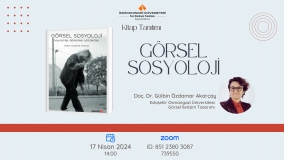
Book Presentation and Talk: Visual Sociology
Department of Sociology invites you to the Book Presentation and Talk event with Gülbin Özdamar Akarçay, the author of “Visual Sociology". Date:
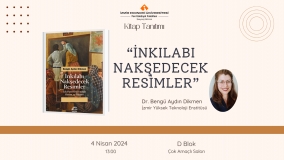
Book Presentation and Talk: Painting the Revolution
Department of Sociology invites you to the Book Presentation and Talk event with Dr. Bengü Aydın Dikmen, the author of “Painting the
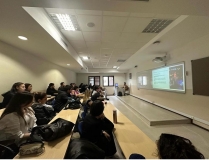
We welcomed ethnomusicologist Onur Sönmez.
We held our sociology seminar where we hosted ethnomusicologist Onur Sönmez. We thank him very much for this detailed and interesting presentation.
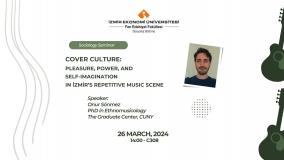
Cover Culture: Pleasure, Power, and Self-Imagination in İzmir’s Repetitive Music Scene
You are cordially invited to the Sociology Seminar where we will host Dr. Onur Sönmez. Onur Sönmez has a PhD in ethnomusicology
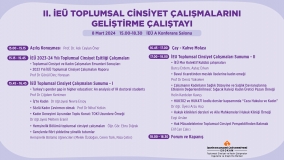
II. IUE GENDER STUDIES DEVELOPMENT WORKSHOP (EKOKAM- Gender and Women’s Studies Research and Application Center)
Research Assistant Helin Kardelen Kavuş attended the “II. IUE Gender Studies Development Workshop” on March 8, 2024, International Women's Day. Organized by EKOKAM, the workshop
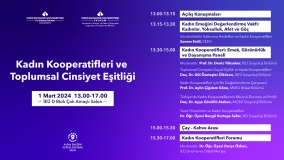
Women’s Cooperatives and Gender Equality
You are cordially invited to "Women's Cooperatives and Gender Equality", which will be co-organized by IUE EKOKAM, the Department of Sociology, and
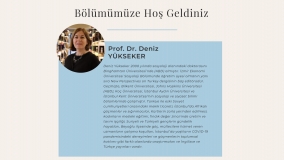
Welcoming Our New Faculty Member: Professor Deniz Yükseker
We are proud to welcome and introduce our newest faculty member: Professor Deniz Yükseker. We wish her all the best and success
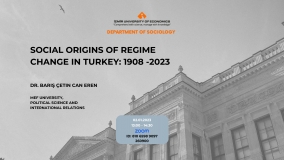
Sociology Seminar: Social Origins of Regime Change in Turkey: 1908 -2023
Department of Sociology cordially invites you to a seminar on "Social Origins of Regime Change in Turkey: 1908 - 2023" by Dr.



